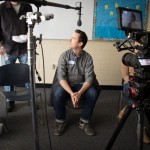
I attend a monthly documentary club in the Twin Cities, where directors screen their works-in-progress. When Kyle Whitney shared his footage of interviews with nuclear bomb survivors in Japan, my jaw dropped at these stories he captured.

I recently scored an intriguing documentary by prolific director Melody Gilbert, called Silicone Soul. It features people (mostly men) who develop relationships with their life-size silicone dolls. It's one that will likely make you uncomfortable at first, but by the end you may have more empathy for the subjects than you might expect.

How does a composer write music that doesn't draw attention to itself? How can a director convey scoring ideas if they're not a musician? Why is temp music important for an editor? When should sound design reflect the real world, and when should it be from a character's psychological perspective? Will the dialogue editor choose the lavalier or boom mic recording, or both?
These are just a few of the conversation-sparking questions we discuss in today's Composer Quest podcast episode (the season six finale!), featuring the team behind the upcoming film Twin Cities. You'll get to hear perspectives on film sound from a director/writer (David Ash), producer/editor (Jason P. Schumacher), sound designer (Mike Hallenbeck), and composer (me). We dissect the entire post-production sound process, from a spotting session with all four of us, to our experimental on-the-spot scoring session, which was very productive and slightly nerve-racking for me as the composer.

Crystal Grooms Mangano recently scored the documentary Asperger's Are Us, which follows a comedy troupe of four autistic guys. In this episode of Composer Quest, Crystal shares her process in deciding how to score this comedic documentary. I also ask Crystal about scoring the trailer for the Patrick Steward film Match, and we talk about the merits of flute in film scores.

When I called up Sage Lewis on Skype, I didn't realize he was a fellow Minnesotan. He's now out in LA, composing for films like Operator, starring Mae Whitman and Martin Starr, and a VR film called The Surrogate. In this episode of Composer Quest, we talk about what it takes to move to and find connections in LA. I also ask Sage about his score for the short film Caterwaul, about an old man and his mutant lobster wife.

Tommy Kraft has been "living under a bridge" in order to finish his passion project, the feature-length Star Trek film Horizon. He's doing almost everything himself: directing, writing, editing, composing, visual effects, and even making the costumes. The film is Tommy's ode to the Enterprise TV series, which played an important role in his life by helping him sort through his struggle with depression. In this episode of Composer Quest, I talk with Tommy about his approach to scoring Horizon, and he shares words of wisdom on running a Kickstarter and producing a large creative project.